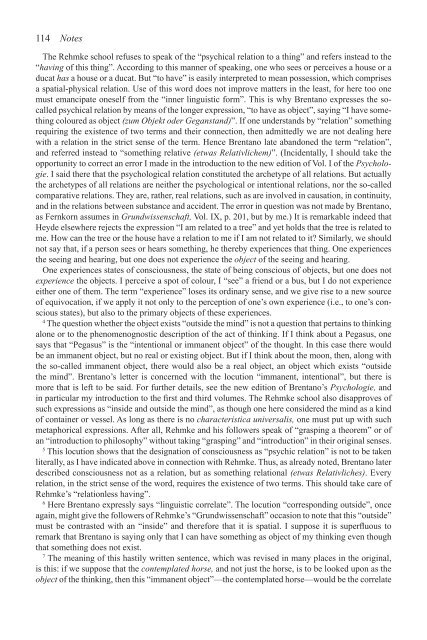Franz Brentano_The True and the Evident.pdf
Franz Brentano_The True and the Evident.pdf
Franz Brentano_The True and the Evident.pdf
You also want an ePaper? Increase the reach of your titles
YUMPU automatically turns print PDFs into web optimized ePapers that Google loves.
114 Notes<br />
<strong>The</strong> Rehmke school refuses to speak of <strong>the</strong> “psychical relation to a thing” <strong>and</strong> refers instead to <strong>the</strong><br />
“having of this thing”. According to this manner of speaking, one who sees or perceives a house or a<br />
ducat has a house or a ducat. But “to have” is easily interpreted to mean possession, which comprises<br />
a spatial-physical relation. Use of this word does not improve matters in <strong>the</strong> least, for here too one<br />
must emancipate oneself from <strong>the</strong> “inner linguistic form”. This is why <strong>Brentano</strong> expresses <strong>the</strong> socalled<br />
psychical relation by means of <strong>the</strong> longer expression, “to have as object”, saying “I have something<br />
coloured as object (zum Objekt oder Geganst<strong>and</strong>)”. If one underst<strong>and</strong>s by “relation” something<br />
requiring <strong>the</strong> existence of two terms <strong>and</strong> <strong>the</strong>ir connection, <strong>the</strong>n admittedly we are not dealing here<br />
with a relation in <strong>the</strong> strict sense of <strong>the</strong> term. Hence <strong>Brentano</strong> late ab<strong>and</strong>oned <strong>the</strong> term “relation”,<br />
<strong>and</strong> referred instead to “something relative (etwas Relativlichem)”. (Incidentally, I should take <strong>the</strong><br />
opportunity to correct an error I made in <strong>the</strong> introduction to <strong>the</strong> new edition of Vol. I of <strong>the</strong> Psychologie.<br />
I said <strong>the</strong>re that <strong>the</strong> psychological relation constituted <strong>the</strong> archetype of all relations. But actually<br />
<strong>the</strong> archetypes of all relations are nei<strong>the</strong>r <strong>the</strong> psychological or intentional relations, nor <strong>the</strong> so-called<br />
comparative relations. <strong>The</strong>y are, ra<strong>the</strong>r, real relations, such as are involved in causation, in continuity,<br />
<strong>and</strong> in <strong>the</strong> relations between substance <strong>and</strong> accident. <strong>The</strong> error in question was not made by <strong>Brentano</strong>,<br />
as Fernkorn assumes in Grundwissenschaft, Vol. IX, p. 201, but by me.) It is remarkable indeed that<br />
Heyde elsewhere rejects <strong>the</strong> expression “I am related to a tree” <strong>and</strong> yet holds that <strong>the</strong> tree is related to<br />
me. How can <strong>the</strong> tree or <strong>the</strong> house have a relation to me if I am not related to it? Similarly, we should<br />
not say that, if a person sees or hears something, he <strong>the</strong>reby experiences that thing. One experiences<br />
<strong>the</strong> seeing <strong>and</strong> hearing, but one does not experience <strong>the</strong> object of <strong>the</strong> seeing <strong>and</strong> hearing.<br />
One experiences states of consciousness, <strong>the</strong> state of being conscious of objects, but one does not<br />
experience <strong>the</strong> objects. I perceive a spot of colour, I “see” a friend or a bus, but I do not experience<br />
ei<strong>the</strong>r one of <strong>the</strong>m. <strong>The</strong> term “experience” loses its ordinary sense, <strong>and</strong> we give rise to a new source<br />
of equivocation, if we apply it not only to <strong>the</strong> perception of one’s own experience (i.e., to one’s conscious<br />
states), but also to <strong>the</strong> primary objects of <strong>the</strong>se experiences.<br />
4 <strong>The</strong> question whe<strong>the</strong>r <strong>the</strong> object exists “outside <strong>the</strong> mind” is not a question that pertains to thinking<br />
alone or to <strong>the</strong> phenomenognostic description of <strong>the</strong> act of thinking. If I think about a Pegasus, one<br />
says that “Pegasus” is <strong>the</strong> “intentional or immanent object” of <strong>the</strong> thought. In this case <strong>the</strong>re would<br />
be an immanent object, but no real or existing object. But if I think about <strong>the</strong> moon, <strong>the</strong>n, along with<br />
<strong>the</strong> so-called immanent object, <strong>the</strong>re would also be a real object, an object which exists “outside<br />
<strong>the</strong> mind”. <strong>Brentano</strong>’s letter is concerned with <strong>the</strong> locution “immanent, intentional”, but <strong>the</strong>re is<br />
more that is left to be said. For fur<strong>the</strong>r details, see <strong>the</strong> new edition of <strong>Brentano</strong>’s Psychologie, <strong>and</strong><br />
in particular my introduction to <strong>the</strong> first <strong>and</strong> third volumes. <strong>The</strong> Rehmke school also disapproves of<br />
such expressions as “inside <strong>and</strong> outside <strong>the</strong> mind”, as though one here considered <strong>the</strong> mind as a kind<br />
of container or vessel. As long as <strong>the</strong>re is no characteristica universalis, one must put up with such<br />
metaphorical expressions. After all, Rehmke <strong>and</strong> his followers speak of “grasping a <strong>the</strong>orem” or of<br />
an “introduction to philosophy” without taking “grasping” <strong>and</strong> “introduction” in <strong>the</strong>ir original senses.<br />
5 This locution shows that <strong>the</strong> designation of consciousness as “psychic relation” is not to be taken<br />
literally, as I have indicated above in connection with Rehmke. Thus, as already noted, <strong>Brentano</strong> later<br />
described consciousness not as a relation, but as something relational (etwas Relativliches). Every<br />
relation, in <strong>the</strong> strict sense of <strong>the</strong> word, requires <strong>the</strong> existence of two terms. This should take care of<br />
Rehmke’s “relationless having”.<br />
6 Here <strong>Brentano</strong> expressly says “linguistic correlate”. <strong>The</strong> locution “corresponding outside”, once<br />
again, might give <strong>the</strong> followers of Rehmke’s “Grundwissenschaft” occasion to note that this “outside”<br />
must be contrasted with an “inside” <strong>and</strong> <strong>the</strong>refore that it is spatial. I suppose it is superfluous to<br />
remark that <strong>Brentano</strong> is saying only that I can have something as object of my thinking even though<br />
that something does not exist.<br />
7 <strong>The</strong> meaning of this hastily written sentence, which was revised in many places in <strong>the</strong> original,<br />
is this: if we suppose that <strong>the</strong> contemplated horse, <strong>and</strong> not just <strong>the</strong> horse, is to be looked upon as <strong>the</strong><br />
object of <strong>the</strong> thinking, <strong>the</strong>n this “immanent object”—<strong>the</strong> contemplated horse—would be <strong>the</strong> correlate
















